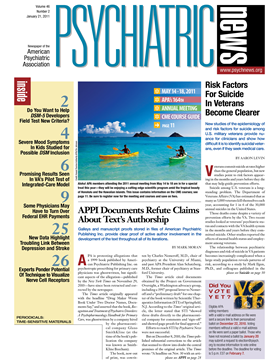APA is protesting allegations that a 1999 book published by American Psychiatric Publishing Inc. on psychotropic prescribing for primary care physicians was ghostwritten, but significant aspects of the allegation—published by the New York Times on November 29, 2010—have since been retracted and corrected by the newspaper.
The Times article originally appeared with the headline “Drug Maker Wrote Book Under Two Doctor Names, Documents Say,” and asserted that the book, Recognition and Treatment of Psychiatric Disorders: A Psychopharmacology Handbook for Primary Care, was ghostwritten by a company hired by the pharmaceutical company Glaxo SmithKline (at the time of the book's publication the company was known as SmithKline Beecham).
The book, now out of print, was cowritten by Charles Nemeroff, M.D., chair of psychiatry at the University of Miami, and past APA President Alan Schatzberg, M.D., former chair of psychiatry at Stanford University.
The Times article cited documents obtained by the Project on Government Oversight, a Washington advocacy group, including a 1997 proposal letter to Nemeroff and a “preliminary draft” for one chapter of the book written by Scientific Therapeutics Information (STI) of Springfield, N.J. According to the Times' original article, the letter stated that STI “showed three drafts directly to the pharmaceutical company for comments and ‘sign-off’ and showed page proofs for final approval.”
Efforts to reach STI by Psychiatric News were not successful.
But on December 8, 2010, the Times published substantial corrections to the article that seemed to throw into doubt the central premises of the original article. The Times wrote: “A headline on Nov. 30 with an article about SmithKline Beecham's role in the publication of a book about treating psychiatric disorders overstated SmithKline's actions. While documents show that SmithKline (now known as GlaxoSmithKline) hired a writing company for the book, they do not indicate that the company wrote the book for the authors, Dr. Charles B. Nemeroff and Dr. Alan F. Schatzberg.”
(A corrected headline, now online, reads “Drug Maker Hired Writing Company for Doctors' Book, Documents Say.”)
In the same correction, the Times further acknowledged that “[t]he article also described incorrectly... events outlined in a letter from the writing company to Dr. Nemeroff. The correspondence proposed a timeline for the writing company to furnish the doctors and SmithKline with draft text and final page proofs for approval; the letter did not say that the company had already provided those materials for final approval.”
The Times went further, acknowledging that comments in the article by David Kessler, M.D., former commissioner of the Food and Drug Administration, regarding the proposal letter and preliminary draft were not represented accurately. Kessler was quoted in the article as saying, after seeing the letter and preliminary draft of the text, “To ghostwrite an entire textbook is a new level of chutzpah.”
But in the correction, the Times stated, “The article misstated the context under which [Kessler] commented about the book's production. The letter and other documents were described to him; he did not personally review the documents.”
APA Medical Director James H. Scully Jr., M.D., and APPI Chief Executive Officer Ron McMillen said the Times seriously overstated the role of the writing company, which did not exceed the kinds of drafting and editing services routinely provided in the publishing of such books—and that there was no undue influence from the drug manufacturer.
In a letter to the Times, which it declined to publish, Scully stated that it was “simply incorrect” that the book was ghostwritten. The Times reporter, he continued, had “used an analysis of a single proposal letter as the basis of his article, and the headline and article both overreached and drew an inaccurate conclusion. All assistance was appropriately acknowledged. The book was reviewed for any potential bias (among other things) by eight independent reviewers, and there was no undue influence on the content from industry or any other outside source.”
In a joint statement to Psychiatric News, Nemeroff and Schatzberg emphasized that STI had an unrestricted grant from SmithKline Beecham and was in no way working for the drug company. “SKB did not write the book nor was STI hired by SKB to work on it,” the authors said. “The article indicates the company gave an unrestricted grant to STI, and that was confirmed independently by a SKB spokesperson. Thus the [original] headline comports neither with the reality nor the article.”
They added, “In all branches of academic medicine, graduate students, research assistants, fellows, and others contribute in various ways to scientific manuscripts. Their contributions are recognized as either co-authors or in the acknowledgements for their technical or other assistance. Over the last decade, guidelines for authorship have evolved but were certainly not as well established in 1997 as they are today, when this project was initiated. Nevertheless, appropriate credit to the STI staff was provided. It is also important to note that we were not remunerated by SKB for any of this work. Our desire to educate primary care physicians led us to convince SKB to provide an unrestricted educational grant for editorial assistance and to distribute the primer to family doctors.”
In an interview with Psychiatric News, McMillen said that APPI has extensive files, proofs, and manuscript versions of the book that clearly demonstrate the active involvement of Schatzberg and Nemeroff in every stage of the book's development. “I've seen the files, and you can clearly see author involvement,” he said. “Schatzberg and Nemeroff have margin notes in all of the galleys with their initials throughout all of the various iterations. We also had the book peer reviewed by more people than is routine. The peer-review comments were sent to [STI], and every single one of them was incorporated. The writer for STI was clearly working for us.
“To call that ghostwritten is just absurd,” McMillen said.

